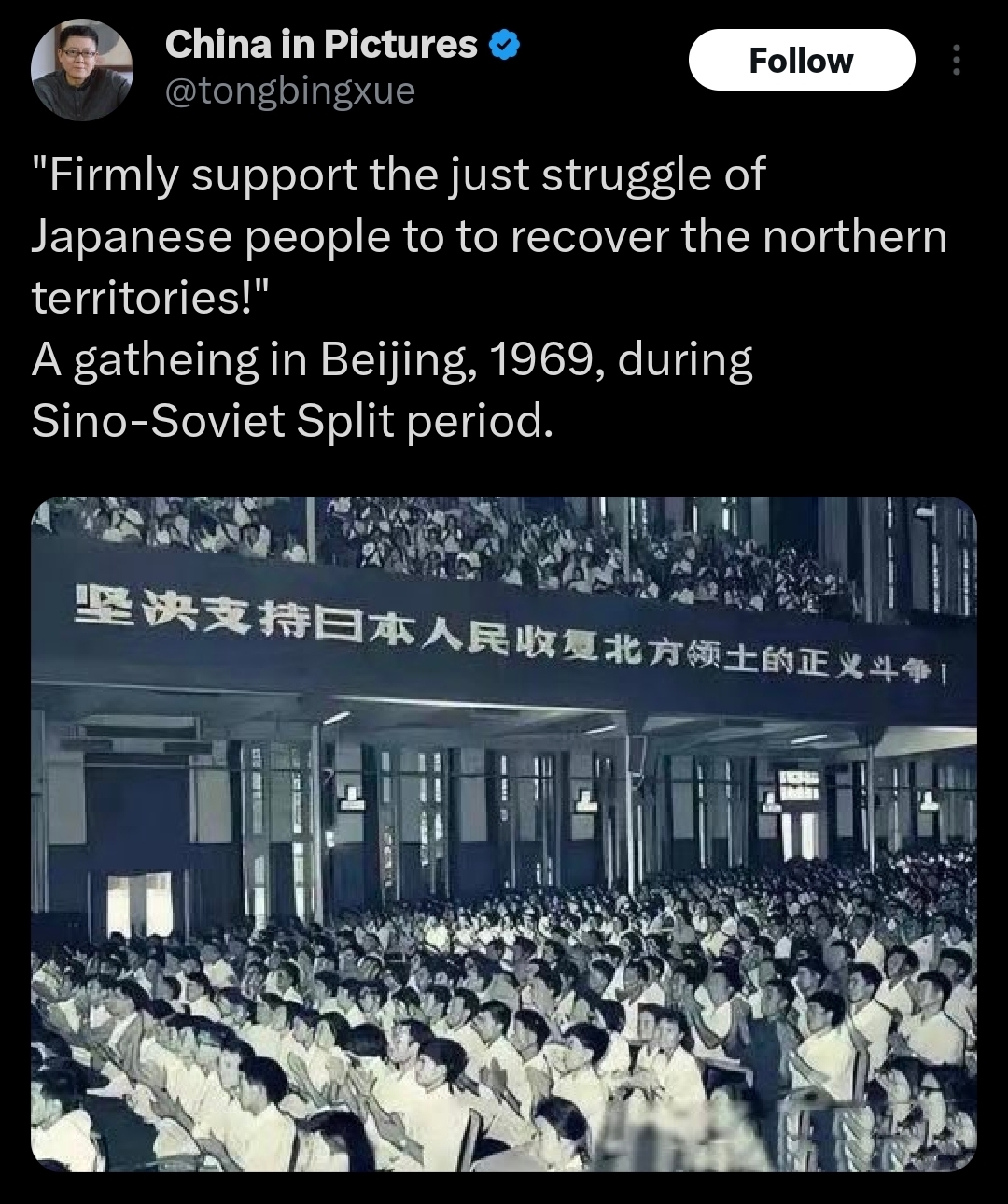I still don't understand how anybody can defend the foreign policy of the PRC at the time.
the PRC is still here, the USSR is not

And if the PRC hadn’t supported its destruction maybe the USSR would still be here
Cool. I guess every socialist project should just ally with the US and fight all of the other socialist projects. Down with international solidarity, up with helping the Imperial Core keep its hegemony! /s
Now the PRC remains with much diminished allies, having assisted in the ruination of Afghanistan, driving Vietnam away, and with NATO still being the dominant force in the world.
And Chinese policy during that time was a major factor in why that happened. Not the only one, but the USSR didn’t fall apart in a vacuum.
The USSR didn't fall apart, it was dismantled top-down. Important difference IMO
It was definitely initiated from the top down I would say. But at the end of the day, whatever mass strikes, work actions, and army mutinies occured were not enough to stop Yeltsin and the west from dissolving the SU into what it is now.
I don't want to mean this as blaming the average Soviet citizen but the fact is; whether from apathy with the old system, or naive hope that westernising would bring prosperity, or being outgunned by Yeltsins military, they and their organisations were sadly unable to defend the Soviet republics. All communists need to take sober lessons here. If it is the first task of the workers' party to instill a revolutionary spirit in the working class, the second and even harder one must be to convert that spirit into a mass commitment to the socialist project.
Biggest L of the USSR in my opinion is its lack of democratization over the years. After WW2, the soviet government and institutions were very much respected by the people, and the country well established in time and stability, and top spheres of institutions being too independent and not committed to a more, well, soviet (as in workers council) form of government, is a huge loss that paved the way for Glasnost, Perestroika and eventually the dissolution. The book "Socialism Betrayed" makes a really good depiction of this in my opinion.
None of this, though, means that the dissolution of the USSR was desired by its peoples for the vast majority of the people, with some possible exceptions in the Baltics and Georgia due to a history of nationalism and Russophobia being exploited during Glasnost. It's not a color revolution as happened in, say, Poland. It was a centralised, institutional process that didn't even involve the people of the country. It's because of this that it's important to me to make a point not to use the word "fall" or "collapse" of the USSR, and to make very clear that the dissolution didn't happen because of any economic failure or due to people's will as so many people believe, but that it was dissolved top down by a minority of individuals in the government against the overwhelming majority in an antidemocratic fashion, with no economic crisis involved other than the small one generated by Perestroika itself.
Workers councils, led by who, though? United in what structures, along what lines, with what discipline to guarantee it; and what is the context and remnant class character and superstructural drives from which these executive-power worker-councils would emerge and lead if given full power? This would almost certainly just amount to 'trade-union-consciousness-as-countries' in the best case
in the worst case and almost assuredly eventually with the help of imperialist powers and the maneuvering of less idealist factions an active counter-revolution and re-establishment of right wing governance ruled by white terror.
Workers councils led by who? Solidarnosc et al. should have had equal power as the central Party power structures because of 'democracy'? We must realize that a large portion of the eastern bloc states the west eventually helped pry off into capitalist abyss with the help of reactionaries (after having been building active networks to do so since even before WW2 ended, from gladio and propaganda stations and other intelligence operations) were many of them previously run by fascists. Like actual concentration camp death camp holocaust-by-bullets Nazis and collaborators. There were material reasons there was strict maintenance of Party discipline and organization in Eastern Europe like in the Baltics and Hungary etc.; These were political decisions gleaned from political lessons learned from the 1910s domestic revolutionary wars in these Eastern European countries and resultant white terrors in their failures, and the political realities manifested leading up to, through, and after WW2. Democratizing to the degree of 'council communism' would mean handing power back to the same people that the Hungarian rebellion in Hungary in 56 let out of prison en masse (arrow cross et al.) turning it into a fascist counterrevolution. The same people that Kruschev himself let out of prison all over the country while dumping as much blame as he could whether it was true or not on Stalin (and half of the things that were true or partially so Kruschev himself acted as a fore-running hatchet-man and architect).
The Great Patriotic War murdering 30 million Soviets including the vast majority of the most politically serious, motivated, and energetic working class youth who would have come up in the next generation had a larger effect than pretty much anything else, and is rarely talked about as being so for some reason. This being followed only a decade later (as Lenin reminds us in "Left-Wing" Communism
by the yardstick of world history a decade "is a trifle that cannot be considered even approximately") by the Kruschev bloc using this circumstance, winning out in a violent power struggle (remember he shot and imprisoned his opponents and threatened the others into submission, very ironic) and giving amnesty to a HUGE amount of reactionaries including active fascist agitators and militant nationalist rebels from all over the Union, which predictably produced, and severely aggravated existing, contradictions in society when they immediately resumed all the activities they were put in prison for previously refusing to stop; all while severing the USSR from its material history and setting it afloat in idealism and revisionist complacency of "the fight is over, the bad man is gone" in this context, raising the new generations within this framework, and sustained to its demise by the pathological denialism of the nature and proper handling of the emergent second economy which found great advantage in all of this.
These and others are more of a factor than anything for why there was eventually such a complacent malaise in socialist construction, entrenchment of the gerontocracy of opportunists and cowards; and an inability amidst their own contradictions (which Kruschev worsened) to further democratize and open up as Stalin himself had been working toward with the 'Stalin Constitution' in the 1930s, before world circumstances became dire, and necessity called for centralized pushes for rapid industrialization, war preparations, rooting out the mass wrecking activities (which even US industrial advisors were shocked by, saying they'd leave a new machine and come back next day and its oil intake would be filled with sand, speaking of this as a commonplace not-at-all isolated incident) and needing to pre-empt and defend in general against 5th columns, which plagued every other nation when war broke out (half of France greeted the Nazis as friends and murdered their own people hand-in-hand with them, same with the Sudeten Henleins, Slovakian Tisos, Belgian De Grelles, Norwegian Quislings etc. which the Soviets couldn't afford).
The situation wasn't so simple as "just democratize and decentralize" because there were incredibly sharp and severe contradictions that made that untenable; which Kruschev's dumbass policies, against which the will to resist was able to be reduced to a few people shot and imprisoned and its terror, and public opinion manipulated in vast broadcasts dumping real, invented, and his own dirt on the still-warm grave of Stalin, after a huge proportion of the most energetic youth were slaughtered in a genocidal imperialist war, worsened severely past the point of being able to handle it. If you let out all of the reactionaries, fascists, anti-Soviet liberal and zionist agitators, nationalist groups who had been armed-rebelling for a decade and a half including during WW2, and all the veterans of the fascist collaborator and fascist partisan groups out of prison who had also many been working with CIA ops facilitated by Gehlen and other US-hired Nazis; you then need to constantly deal with their subsequent activities, and you would be stupid to expand the realms of power to include them acting in these capacities openly. But also once you've done that, the contradiction doesn't go away, so they instead include themselves acting covertly; and since the second economy was simultaneously facilitated-but-denied/ignored by the gerontocracy that was left, they became a match made in heaven together to spearhead the west-comprador-led teardown-and-selloff facilitated and bought-and-paid-for by neo-colonial bankers.
Between that and the invasion of Vietnam, China was really brain broken during that time.
Generally I feel with the Sino Soviet split, USSR was right for the wrong reason, PRC wrong for the right reasons.
What?
Khrushchev (Cornman) was a cringe revisionist, but he did some good stuff. China was right on being critical of Cornman, but their actions after that were cringe.
Yeah pretty much Krushchev and the USSR were usually on the correct side (Cuba, Vietnam etc).
The PRC were often correct in their criticism of the USSR's revisionism but lead to bad stuff like supporting Pol Pot and the Muhjahaden.
Probably a lot of complicated geopolitical shit, but Khruschev is right there so why not just blame him? 
Corn is a tool of ultimate power, uncaring for what ends its used. It built Khrushchev but also Xi. We need to deeply consider these lessons.
Good point, I think I will!
I know I’ve read something Carlos Martinez wrote that was pretty good at discussing the material reasons for the split, but for the life of me I can’t find it; maybe someone else knows what I’m talking about.
It didn’t come out of nowhere, but Khrushchev recalling Soviet advisors and tech transfers was a HUGE provocation. China had and still does highly value advancing their technological position. Reform and Opening Up was as much about advancing their tech capabilities as it was developing the productive forces. Also, there really was an ideological difference over the USSR seeking peaceful accommodation with the west (ironic given how China’s position in the 70s overshot the USSR’s stance on this by a good margin). That’s not the whole story, just a couple parts that I can recall.
Khrushchev also threatened to nuke China. There's that as well.
Is this the article?
Mao, being a true adherent of Socialism in One Country, knew: there can only be one.
Iirc, China used to support Japan and the JCP until the early 1980's. Mostly bc of the Soviet-Sino split and bc of Japan's economy. I guess there was a small period where China, Japan and the Koreas could have created their own economic bloc. But that quickly ended, the USSR ended the split in 1988 with Gorbachev visiting China, and Japan's economy got fucked.
It’s why Trotskyism lives in my mind like Homer and the clown college ad.
chapotraphouse
Banned? DM Wmill to appeal.
No anti-nautilism posts. See: Eco-fascism Primer
Slop posts go in c/slop. Don't post low-hanging fruit here.
